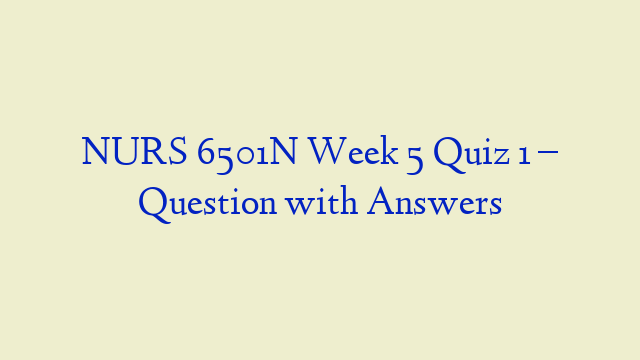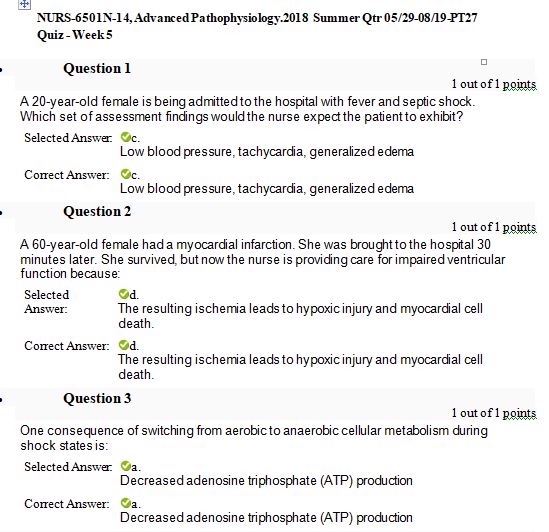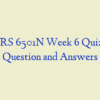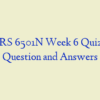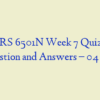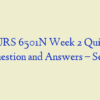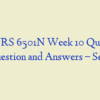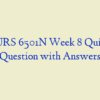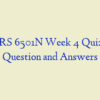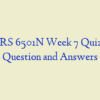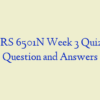Description
NURS 6501N Week 5 Quiz Answers – Advanced Pathophysiology
- A 20-year-old female is being admitted to the hospital with fever and septic shock. Which set of assessment findings would the nurse expect the patient to exhibit?
- A 60-year-old female had a myocardial infarction. She was brought to the hospital 30 minutes later. She survived, but now the nurse is providing care for impaired ventricular function because:
- One consequence of switching from aerobic to anaerobic cellular metabolism during shock states is:
- What factors make a patient prone to neurogenic shock? Neurogenic shock can be …..by any factor that inhibits the:
- A 1-month-old infant visits his primary care provider for a well-baby check. Physical exam reveals decreased cardiac output, hypotension, tachycardia, and a loud murmur suggestive of aortic stenosis. Which of the following would be expected with this diagnosis?
- A 15-year-old male who is allergic to peanuts eats a peanut butter cup. He then goes into anaphylactic shock. Which assessment findings will the nurse assess for?
- A 10-year-old male presents with fever, lymphadenopathy, arthralgia, and nose bleeds. He is diagnose with rheumatic heart disease. While planning care, which characteristic changes should the nurse remember?
- A 72-year-old female has a history of right heart failure caused by a right ventricular myocardial infarction. Which of the following symptoms are specifically related to her right heart failure?
- While planning care, the nurse remembers which principle? In valvular _____, the valve opening is c…..and narrowed because the valve leaflets, or cusps, fail to open completely.
- A 51-year-old male presents with recurrent chest pain on exertion. He is d……with angina pectoris. When he asks what causes the pain, how should the nurse respond? The pain occurs when:
- An 8-week-old infant presents to her primary care provider for a well-baby check. Physical exam reveals a murmur, and an echocardiogram shows a large ventricular septal defect. If left untreated, what condition should the nurse discuss with the parents?
- A nurse is explaining the function of the heart. Which is a correct response by the nurse? A function of the pericardium is to:
- Which of the following lab tests will the nurse check to help diagnose heart failure and provide insight into its severity?
- A 49-year-old male presents to his primary care provider reporting chest pain. EKG reveals ST elevation. He is diagnosed with myocardial ischemia. Which of the following interventions would be most beneficial?
- Which is the most common type of congenital heart defect the nurse should assess for in infants?
- When a patient with left heart failure starts to have a cough and dyspnea, which principle should the nurse remember? Pulmonary symptoms, common to left heart failure, are a result of:
- A 42-year-old female is diagnosed with constrictive pericarditis. The nurse assesses the blood pressure for decreased cardiac output because of:
- When a person is in shock, a nurse remembers impairment in cellular metabolism is cause by nurs 6501n week 5 quiz
- A 55-year-old male died of a myocardial infarction. Autopsy would most likely reveal:
- A nurse recalls the most common cardiac valve disease in the United States, which tends to be most prevalent in young women, is:
- A 3-year-old male is diagnosed with Kawasaki disease. Which of the following does the nurse suspect is the most likely cause?
- For an infection to progress to septic shock, which of the following factors should the nurse determine occurred?
- A 72-year-old female has a history of hypertension and atherosclerosis. An echocardiogram reveals backflow of blood into the left ventricle. Which of the following is the most likely diagnosis …..on the chart?
- A newborn child has a murmur and cyanosis. An echocardiogram reveals that the tricuspid valve failed to develop and no blood flows between the right atrium and ventricle. What term will the nurse use to describe this condition? Tricuspid:
- A 75-year-old obese female presents to her primary care provider reporting edema in the lower extremities. Physical exam reveals that she has varicose veins. Upon performing the history, which of the following is a possible cause for the varicose veins?
- A 67-year-old female was previously ….with rheumatic heart disease. Tests reveal lipoprotein deposition with chronic inflammation that impairs blood flow from the left ventricle into the aorta. Which of the following is the most likely diagnosis …..on the chart?
- A 50-year-old male was …..to the intensive care unit with a diagnosis of acute myocardial infarction (MI). He is being ….for shock. His cardiopulmonary symptoms include low blood pressure, tachycardia, and tachypnea. His skin is pale and cool. The primary cause of his shock is most likely nurs 6501n week 5 quiz
- An infant undergoes an echocardiogram for a suspected heart defect. Tests reveal an opening in the middle of the atrial septum. What term would the nurse use to describe this defect?
- A 2-week-old infant presents with poor feeding, fatigue, dyspnea, and a murmur. She is diagnosed with a patent ductus arteriosus (PDA). A nurse recalls this condition results in a(n):
- A 60-year-old female was ….with mitral stenosis. As a result, the nurse realizes the patient has incomplete emptying of the:

